
Combat Ulcers, Cancer, and Heart Disease With This Thanksgiving Favorite
Dear reader,
Turkey… check.
Mashed potatoes… check.
Green beans… check.
Yams… check.
Pumpkin pie… check.
At this time of year, these are your thoughts not only in the checkout line but throughout most of your day. A prefect Thanksgiving feast takes a lot of preparation and work to pull off. So many dishes for just one meal.
But what if I told you one of these classic Thanksgiving staples could help combat cancer, fight inflammation, and ward off ulcers?
I know what you might be thinking — no way is cornbread stuffing or mac and cheese going to help my body in the fight against disease.
You’re right, they aren’t.
Those dishes are both just nutrient-empty carbs, delicious as they may be.
In contrast, a traditional Thanksgiving fruit has much more to offer than its starchy tablemates. Rich in anti-inflammatory phytonutrients, antioxidants, and bacteria-fighting micronutrients, cranberry is the king of the Thanksgiving spread.
And I am not talking about that gelatinous cran-log your sister slides out of a can and onto a plate every year.
I am talking about real cranberries. You know, the ones that are actually berry shaped, taste tart (like they naturally do), and don’t require a can opener and a carving knife to serve or an insulin shot after eating.
Natural cranberries easily make a tasty, homemade, and healthy sauce for your holiday meals without using marshmallows, Jell-O and granulated sugar. I will share a recipe in a bit.
But first, let’s see what kind of health benefits this humble holiday fruit has for you.
Ulcer, Heart Disease, and Cancer Annihilator
Most of us are probably aware that cranberries are a tried-and-true remedy for urinary tract infections (UTI), but they have so much more to offer.
Cranberries contain proanthocyanidins (PACs). These are micronutrients that help fight UTIs. PACs do this by creating a barricade between bacteria and the lining of the urinary tract. But they also help fight other infections.
While there needs to be more research in this area, a study in the Journal of Gastroenterology and Hepatology found cranberries may protect the stomach from ulcers with the same mechanism.
By blocking bacteria, specifically Helicobacter pylori, from latching onto the stomach wall PAC’s inhibit their growth and reduce the risk of ulcers.1
But, H. pylori doesn’t just cause ulcers; it can infect them as well. Complications from these infections can lead to internal bleeding, stomach obstruction, and perforation (holes) of the stomach wall. A hole in your stomach could really ruin your day.
And if that wasn’t enough — H. pylori infections increase the risk of stomach cancer.2
Cranberries help your digestive tract in other ways too.
A study in The FASEB Journal (published by the Federation of American Societies for Experimental Biology) has shown cranberry may help to balance your gut bacteria. Drinking cranberry juice aids in the increase of Bifidobacteria, a gut-friendly microbe, while maintaining levels of other types of bacteria. 3
The more gut-friendly bacteria you have, the easier digestion should be for you.
In addition, its anti-inflammatory antioxidants help reduce the chances of gum disease by stopping cytokines. Cytokines send the message to our cells for an inflammatory response. By halting cytokines, inflammation can be inhibited. Flavonoids and other antioxidants also help reduces risk of gum disease as well has colon cancer.4
Cranberry also has heart protecting properties.
Inflammation, and oxidative stress can account for damage done to blood vessels and increase the risks of atherosclerosis (hardening of the arteries) and high cholesterol.
Simply drinking cranberry juice can decrease the triggering of enzymes involved in atherosclerosis and has been shown to reduce levels of LDL cholesterol (bad cholesterol) while also increasing levels of HDL cholesterol.
But that’s not all cranberry can do for you.
In addition to halting oxidative stress and reducing inflammation (two major risk factors for cancer growth), studies on human cancer cells have shown cranberry to be a tumor repressor. By triggering programmed cell death it helps reduce tumor growth.
While more studies are needed to prove cranberry as a cancer treatment, there is science saying it helps prevent cancer – breast, lung, colon, and prostate being the most likely.4
OK, now that you know why they are the healthiest choice at the Thanksgiving table, let’s get to cooking!
Say Goodbye to the Cran-log!
Honey Maple Cinnamon Cranberry Sauce
What you will need:
- 1 -12 oz. bag of fresh cranberries
- 1/2 cup maple syrup (whichever grade you prefer)
- 1/2 cup local honey
- 1/2cup water
- 1 cinnamon stick.
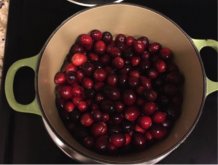
First, rinse your cranberries and place them in a medium-sized pot.
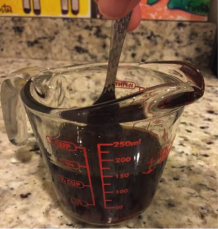
Next mix together the maple syrup and honey. Combining them together makes it quicker and easier to add to the cranberries.
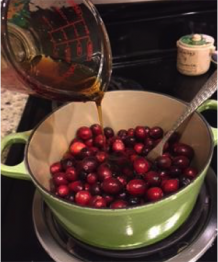
Now add the syrup-honey mixture to the cranberries and stir.
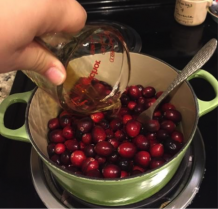
Next add 1/2cup water to the pot and stir. I usually use the same measuring cup so I can mix in the remaining syrup-honey mixture.
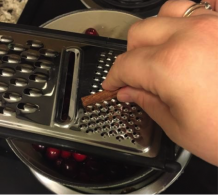
I like to grate a little cinnamon into mine at this point. I grate about a quarter of the stick and then throw the remainder in with the berries in order to get more flavor. If you don’t have cinnamon sticks, you can always add ground cinnamon. After you’re done adding your cinnamon, turn on your burner to just under medium. If your stove has numbers on the dial, I set mine at 4.
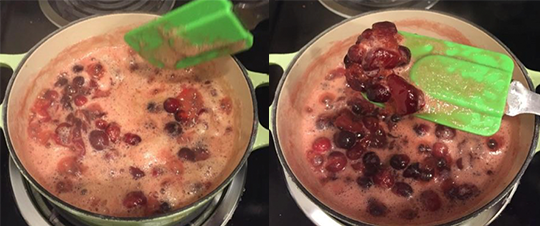
Let your berries heat up for about 15 minutes. Foaming is normal. Stir occasionally and check to see if the berries have popped. Once you see a majority of them have popped, you can turn your burner down to low and let the sauce simmer until you get the consistency you like.
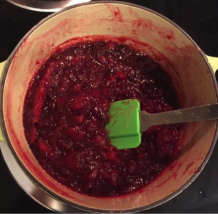
I like mine to be thick. I let it simmer on low for about 20 minutes. As an added bonus, this dish fills your home with its cheerful scent as it reduces. Don’t forget that your cinnamon stick is in there. You can take it out or let it further infuse the dish — just don’t eat it.
You can serve this warm or cool. If you need to store it, let it cool to room temperature and then store in the refrigerator.
This recipe is flexible. If you like your sauce a bit sweeter, add more of the syrup-honey mixture. If you don’t care for cinnamon, don’t add it. You can add in grated orange peels or fresh ginger instead.
The important part is to enjoy the fresh (organic, if you can find it) cranberries with natural sugars and natural flavors. These berries are so delicious there is no need for artificial flavors or colors and refined sweeteners to get in their way!
If you would like to share any healthy cranberry recipes or holiday food favorites, contact me! nmoore@lf.org
Have a wonder Thanksgiving!
Live well,

Natalie Moore
Managing editor, Living Well Daily
Sources
[1] Growth inhibitory action of cranberry on Helicobacter pylori.
[2] How Are H. Pylori Infections Diagnosed?
[4] What’s New and Beneficial About Cranberries
Written By Natalie Moore
Natalie Moore is a dedicated health researcher with a passion for finding healthy, natural, and science-based solutions. After a decade of direct healthcare experience in western and natural medicine, she was involved in public health research before joining Living Well Daily.
View More Free Articles
Stop Obsessing Over Diet Trends
Can we stop with the endless diet debates already? Every other week there’s a new headline shouting about which diet is best for weight loss, heart health, or diabetes. Paleo, keto, low-carb, high-protein… it’s exhausting. And now, a new meta-analysis is out comparing the Mediterranean diet, the DASH diet, and something called AHEI (that’s “Alternative...
A New Reason to Ditch Processed Junk
If you’ve ever walked the inside aisles of your local grocery store and thought, “This is all just junk,” your instincts were spot on. A new study published in the journal Thorax just added another red flag to the list of dangers linked to ultra-processed food—a 41 percent higher risk of lung cancer. That’s right....
When Being Winded on Stairs Is Serious (And When It Isn’t)
I had an athlete visit me recently because he experienced shortness of breath while climbing stairs. He is in great shape, so he was worried about what it might mean. “Doc,” he said, “I run five miles three times a week. Why am I huffing and puffing after two flights of stairs?” His concern is...
Study EXPOSES Hidden Danger Lurking in Your Car
We think of our homes and cars as safe havens. But according to a startling new study, they may be flooding your lungs with microscopic plastic particles—every single day. Researchers in France recently found that adults inhale an average of 68,000 microplastic particles daily from indoor air alone. To put that in perspective, that’s about...
Mailbag: Is Modern Food Making You Snore?
“What can cause snoring, and is there a way to correct this issue?” —Seeking Silence Hi Seeking, Snoring happens when the soft tissues in your throat relax and vibrate as air passes through during sleep. While several factors can cause snoring—from sleep position to nasal congestion—I want to share one trigger that might surprise you....
Simple Food Swap SLASHES Dementia Risk 28%
Let’s be honest… who would jump at the chance to cut their dementia risk by 28 percent. And no, you don’t need to run marathons, survive on broccoli, or learn to play the zither (whatever that is) to make it happen. All it takes is one easy swap—something that’s probably already in your refrigerator. Researchers...
This SMART Floss Exposes Hidden Health Danger
Scientists have created dental floss that doesn’t just clean between your teeth—it also tracks your stress while you’re flossing. Now, I know what you’re thinking… “Great—now even flossing is going to stress me out by telling me how stressed I am.” But this fascinating new tool from Tufts University could be a game-changer for understanding...
Is This "Safe" Sweetener Damaging Your Brain?
The headlines are alarming… “Popular Sugar Substitute Linked to Brain Cell Damage” and “Erythritol Could Damage Critical Brain Barrier” are just two of the dozens I’ve spotted recently. But before you toss every sugar-free product in your pantry, let’s take a closer look at what this study actually shows—and what it doesn’t. The latest research...
This Summer Threat Could SPIKE Your Blood Sugar
Picture this… It’s another scorching hot summer day. You crank up the air conditioning while watching the weather forecast, which predicts yet another “record-breaking” heat wave. It’s starting to feel like just another miserably uncomfortable summer. But what you might not realize is that—if you have diabetes—those rising temps could do far more damage to...
Move Over Yogurt—5 Foods That Pack MORE Probiotics
Let’s talk about your gut. The microbiome is the collection of trillions of bacteria and other tiny organisms that live in and on your body—especially in your gut—and help keep you healthy. I’ve written often about how vital it is to maintain a healthy microbiome. And you might have dutifully added yogurt to your shopping...









